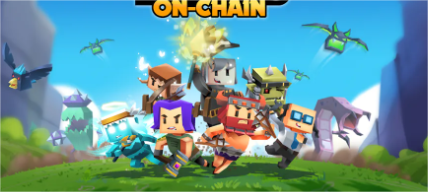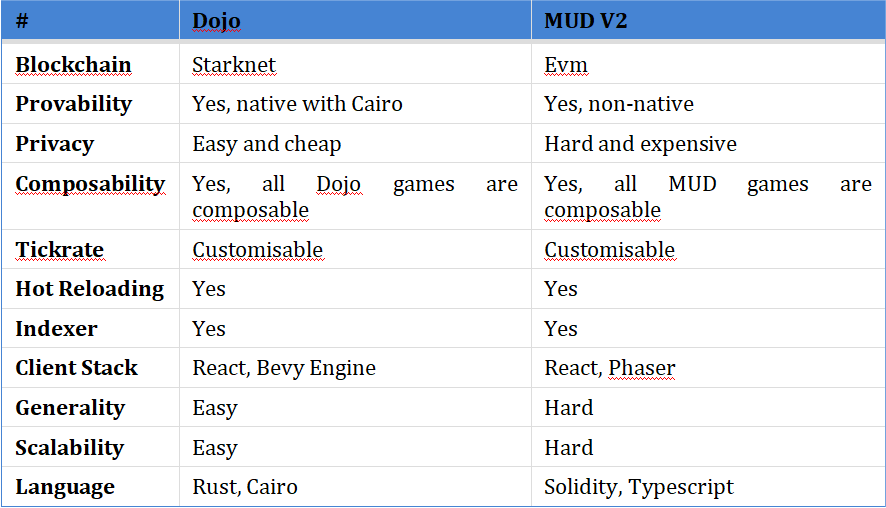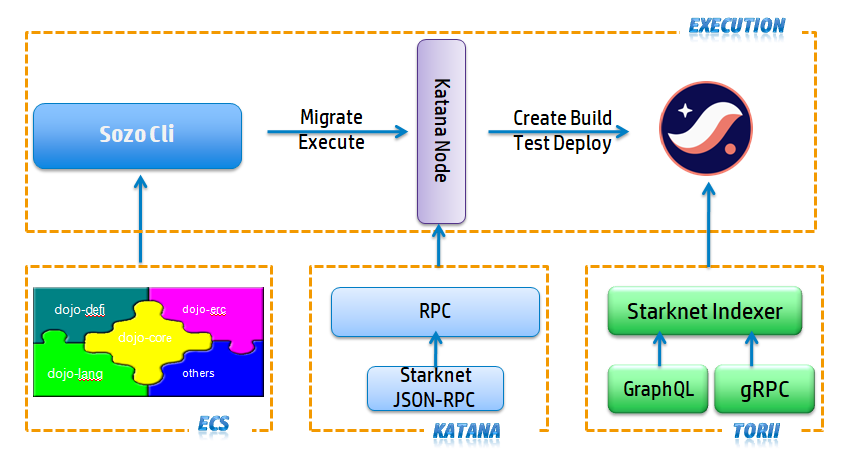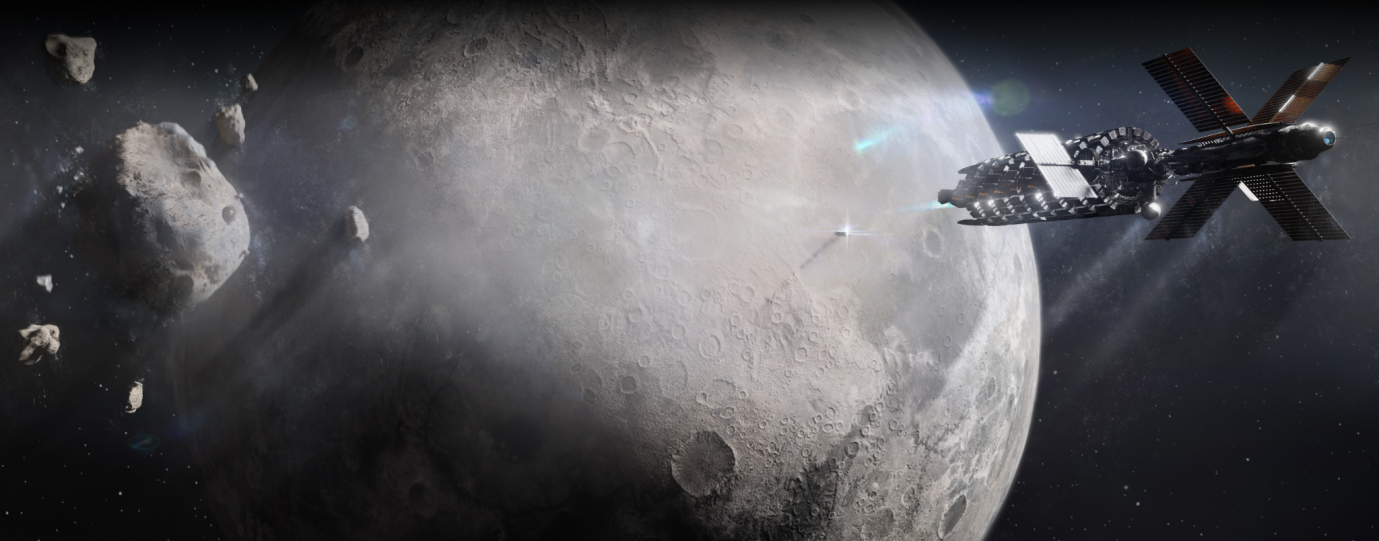Nov 01, 2023
Dojo, The Starting Point for Web3 Games? Ignite Your Journey on Fully On-chain Games
This technical research report was authored by Alex from the ScaleBit Research Group
Fully on-chain Games are a category of games built using blockchain technology, where game assets and data are stored on the blockchain. These games often manage in-game economies in a decentralized manner, allowing players to truly own virtual items within the game. These virtual items typically exist as NFTs (Non-Fungible Tokens), endowing them with uniqueness and scarcity. This means players can own, trade, and even share these virtual items across different games, a concept not achievable in traditional gaming.

1 Dojo vs MUD V2
In the dynamic landscape of blockchain technology and gaming, the development of blockchain-based game engines is gaining momentum. Among these exciting advancements, two notable projects, MUD V2 and Dojo, are emerging as pioneers in the space. These engines are at the forefront of innovation, poised to usher in a new era of gaming by harnessing the potential of blockchain technology.
MUD V2 and Dojo represent the embodiment of the blockchain gaming renaissance, where the decentralized and trustless nature of blockchain networks opens up an array of possibilities for creating immersive, player-driven experiences. While both projects share the common goal of revolutionizing the gaming industry, they each bring their unique characteristics and approaches to the table.
MUD V2 and Dojo are trailblazers in the blockchain gaming landscape, with a vision to empower gamers, creators, and developers in entirely novel ways. These platforms are set to bring greater transparency, ownership, and interoperability to the gaming universe, and their distinctions, as outlined in the table below, illustrate how they are shaping the future of blockchain-powered gaming.

2 History of Dojo
In the quest for the proper realization of a fully on-chain game engine, pioneers have tirelessly embarked on a journey of exploration. Since 2021, the culmination of these explorations can be summarized as follows:
Dope Wars Engine (RYO): Initially, the concept of an engine on Starknet originated from the game Dope Wars. In September 2021, development began on an engine called “Roll Your Own” (RYO) for creating the game ecosystem of Dope Wars. While this engine wasn’t very general-purpose, it was an early attempt.
Explorations into Full On-Chain Autonomous Worlds: Over time, several active core projects on Starknet, such as Loot Realms, Topology, Influence, and others, attempted independent development around the concept of full on-chain autonomous worlds.
The Emergence of MUD: The emergence of MUD injected new vigor into the concept of full on-chain autonomous worlds on Starknet. Simultaneously, with the release of Cario 1.0, an opportunity arose for a fresh start for full-chain games on Starknet.
Birth of Dojo: Shortly after the announcement of Cario 1.0 by StarkWare, core contributors from Loot Realms, the founder of Cartridge, and the founder of Briq proposed the idea of developing a fully on-chain game engine on the Starknet network. By February 2023, Dojo was officially born.
Dojo’s Development Trajectory: In its early stages, Dojo was largely centered around the implementation of MUD in the Cario language on Starknet. However, as time progressed, Dojo started exploring its own path of differentiation, gradually diverging from MUD. The Dojo ecosystem consists of the following core components, as shown in the following diagram:

ECS (Entity Component System): This is an entity component system developed in Cairo. It enables game developers to assign different functionalities (components) to game entities, allowing for the creation of diverse and intricate games. It leverages the transparency and decentralized nature of blockchain technology, supporting the development of complex, dynamic games on the blockchain.
Sozo Migration Planner: Sozo is a toolchain designed specifically for constructing and planning migration strategies for deploying games on Starknet. It streamlines the process of deploying game worlds on the blockchain.
Torii Network and Index Stack: Torii serves as a comprehensive indexing and networking layer within the Dojo ecosystem. It is utilized to retrieve various events and data from the blockchain-based game world. Torii efficiently organizes the state of the Dojo world, enabling clients to query data efficiently. It supports GraphQL queries, providing flexibility in data retrieval.
Katana RPC Development Network: Katana is a high-speed local Starknet node dedicated to supporting local development for Dojo. It permits developers to test applications on the development network, including the initiation of transactions. Katana offers a convenient RPC interface, facilitating developer interaction with Starknet, transaction testing, and network configuration. It also adheres to the Starknet
JSON-RPCspecification, encompassing native Starknet JSON calls such asstarknet_getTransactionReceiptandstarknet_getStorageAt.
These components operate in synergy to establish the bedrock of the Dojo ecosystem, furnishing powerful tools and a platform for the development of intricate blockchain-based games.
3 Advantages of Dojo
Dojo on Starknet offers a robust set of tools and performance advantages, enabling developers to create highly appealing and innovative blockchain games. It fully harnesses the potential of blockchain technology, providing game developers with greater flexibility and possibilities to craft engaging and dynamic gaming experiences.
Zero-Knowledge Proofs (ZKP) technology can safeguard sensitive information while allowing for intricate mechanisms and interactions.
zk-Rollups enhance the scalability and performance of on-chain games, enabling developers to create rich and dynamic gaming experiences.
Account abstraction lowers the entry barrier for ordinary players, improving their overall gaming experience.
In the context of games, Cairo significantly enhances verification and storage efficiency. For example, when developing a chess game using Cairo, it only requires the final state of the game and the description of state transitions, making it sufficient to meet the requirements.
Cairo also offers a range of other features that give it a significant edge over Solidity. These include higher efficiency and scalability, making it better suited to handle extensive computations. This advantage is particularly valuable for applications like games, which involve high-frequency interactions and are sensitive to latency.
4 Use Cases for Dojo
Blockchain-based gaming is fundamentally reshaping the gaming landscape and is even considered as revolutionary as the advent of arcades, game consoles, and mobile devices. It has captured the attention of many users within the cryptocurrency community, while developers are also crafting rich and dynamic gaming experiences.
Influence is a large-scale strategic MMO set in the distant asteroid belt. Players have access to an open economy within the game where they can purchase NFTs to explore and develop asteroids. All these asteroids coexist in a shared world, enabling interaction and collaboration among players.

5 Closing Thoughts
Fully on-chain Games hold immense potential within the blockchain ecosystem, as they combine the decentralized and scarcity features of blockchain technology with the vast market of the gaming industry. With the continuous development and updates in blockchain technology, we can expect to witness the emergence of more innovative and entertaining blockchain gaming projects.
Reference
[1] https://mud.dev/introduction
[3] https://www.influenceth.io/
About ScaleBit
ScaleBit is a blockchain security team that provides security solutions for Mass Adoption of Web3. With expertise in scaling technologies like blockchain interoperability and zero-knowledge proofs, we provide meticulous and cutting-edge security audits for blockchain applications. The team comprises security professionals with extensive experience in both academia and enterprise. Our mission is to provide security solutions for Web3 Mass Adoption and make security accessible for all.
- Website: https://www.scalebit.xyz/
- Twitter: https://twitter.com/scalebit_
